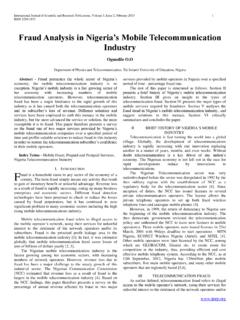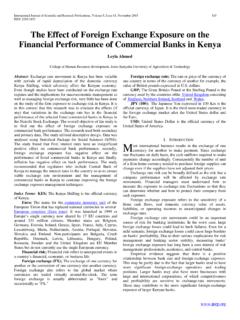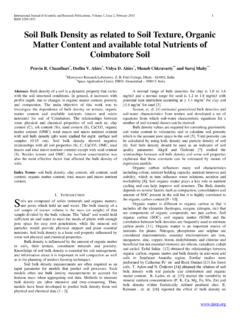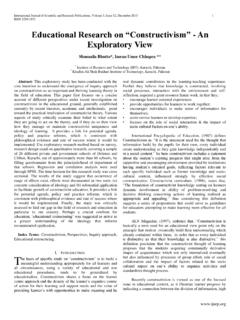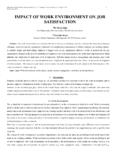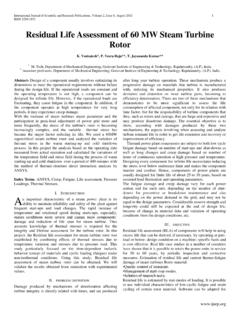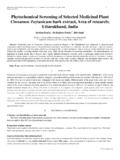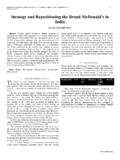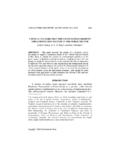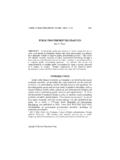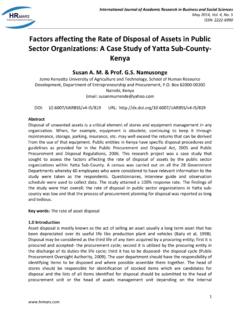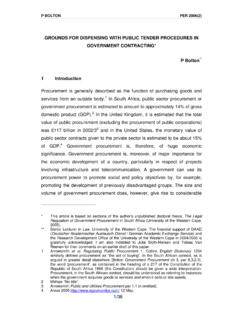Transcription of Ethical Issues in Public Procurement in Kenya - IJSRP
1 International journal of Scientific and Research Publications, volume 5, issue 9, September 2015 1 ISSN 2250-3153 Ethical Issues in Public Procurement in Kenya ISAAC RENSON AYOYI, ODUNGA MUKOSWA Master s in Business Management, MOI University, School of Business and Economics I. INTRODUCTION n the past decades, the Public Procurement system in Kenya has undergone significant developments. From being a system with no regulations in the 1960s, and a system regulated by Treasury Circulars in the 1970s, 1980s and 1990s, the introduction of the Public Procurement and Disposal Act (PPDA) of 2005 and the Procurement Regulations of 2006 has introduced new standards for Public Procurement in Kenya . As a result, Ethical supply chain management is becoming a mainstream business practice in Public sector in Kenya .
2 Ethics in Public Procurement provide advice and guidance to buying organizations on how to develop Ethical purchasing practices in their supply chains (Arkingstall 1994). Although intended primarily for buyers, this guidance applies equally to anyone who has responsibility for managing the supply of goods or services from an external source. It has become essential for Public organizations to have an Ethical policy or code of conduct in Procurement functions (Amstrong and Sweeney 2004). The Chartered Institute of Purchasing and Supply (CIPS) believes that Public entities should universally apply the practice set out (as laws, regulations, policies and procedures) and should encourage all cadre of organizations to include good Ethical business practices in all areas of their work.
3 In this case, organizations should also involve all stakeholders in this process. It is vital that organization s management visibly endorses Procurement Ethical policy. As Ethical supply chain Issues become more widely known, stakeholders are starting to question organizations about their compliance. There has been rapid growth in Ethical investment funds that encourage organizations to look at Issues of corporate social responsibility (Budenhorst 2006). However, although some companies started work on these Issues in the 1980s, Ethical sourcing is still a comparatively new concept for most organizations, especially government owned. Most of empirical research in Supply Chain Management (SCM) associated with unethical practices or behaviors in the buyer-supplier relationship is concerned to the opportunism, generally under the theoretical lens of transaction costs economics.
4 Although opportunism is considered an unethical behavior, it is not the only one. According to Carter (2000) there are other unethical practices which may benefit the firm and/or the professional involved in the transaction. Apparently, there are few empirical studies addressing unethical conducts or behaviors in SCM, excepting the opportunism, despite supply chain professionals are probably more vulnerable to unethical choices because there are simply plenty of opportunities to abuse. Facing increasing demands for cost reductions and unattainable goals, supply chain personnel may succumb under such pressure, engaging in unethical practices (Rottig, Koufteros, & Umphress, 2011). With the enactment of the PPDA and other Regulations, Kenya today has in place a sound and comprehensive legal framework for Public Procurement with a clear hierarchical distinction.
5 The PPDA clearly establishes the Procurement methods to be applied, advertising rules and time limits, the content of tender documents and technical specifications, tender evaluation and award criteria, procedures for submission, receipt and opening of tenders, and the complaints system structure and sequence. The PPDA and Regulations cover goods, works and services for all Procurement using national funds. Both documents are published and widely distributed within government. However, this increased professionalism has not, however, proved to be an adequate defence against the temptation to act unethically by purchasing and sales people. Bribery, gift-giving and entertainment have been and are being used to induce purchasing personnel to favour particular suppliers rather than be guided solely by factors such as price, quality and delivery.
6 This paper will look at ethics in Public Procurement and how its role in Procurement performance in Public sector in Kenya . II. PURPOSE OF THE STUDY The purpose of this paper was to analyze Ethical Issues in Public Procurement in Kenya . This paper was guided by the following research questions: What Ethical Issues are incorporated in Public Procurement in Public institutions in Kenya ? What is the role of; Procurement standards, policies and regulations on Procurement functions of Public institutions in Kenya ? III. METHODOLOGICAL APPROACH A literature review was conducted aiming to collect and analyze all relevant papers (by content analysis) complying with empirical studies that address the specific issue of ethics in the buyer-supplier relationship and along the supply chain.
7 As a result of this review, a discussion on Ethical Issues in supply chain in Public Procurement was presented and finally, credible results, conclusion and recommendations also given. IV. DISCUSSION Ethics are the guidelines or rules of conduct by which we aim to live on. Organizations like individuals have Ethical standards and frequently Ethical codes (Peter and Bailey 2005). The Ethical standards of an organization are judged by its actions and the actions of its employees, not by pious statements of intent put out in its name. The pressures which the marketplace I International journal of Scientific and Research Publications, volume 5, issue 9, September 2015 2 ISSN 2250-3153 exerts on purchasing departments and on individual buyers make it essential that top management, purchasing and supply managers, buyers and all other members of the Procurement system recognize and understand both professional and Ethical standards required in performance of their duties.
8 According to Kothari (2004) emphasizes on Procurement ethics being important in Procurement for the following reasons: Procurement staffs are the representatives of their organization in dealing with suppliers, sound Ethical conduct in dealing with suppliers is essential to the creation of long-term relationships and the establishment of supplier good will, it is impossible to claim professional status for Procurement without reference to a consideration of its Ethical aspects. The theoretical background underlying this review comprises three different fields of knowledge: supply chain management, business ethics, and behavioral ethics. In this study, the definition of supply chain management ( Procurement ) is that offered by Mentzer, DeWitt, Keebler, & Min (2001): Supply chain management is defined as the systemic, strategic coordination of the traditional business functions and the tactics across these business functions within a particular company and across business within the supply chain, for the purposes of improving the long-term performance of the individual companies and the supply chain as whole.
9 With this definition, the focus of SCM is on the different levels of analysis and the business operations within the channel from the point-of-origin to the point-of-consumption. Business ethics pertains to the conceptual field of social responsibility, which has been centered a real debate for decades, showing very different philosophical positions. For example, Friedman (1992) argued that the doctrine of social responsibility is fundamentally subversive , asserting: Few trends could so thoroughly undermine the very foundations of our free society as the acceptance by corporate officials of a social responsibility other than to make as much money for their stockholders as possible (Friedman, 1992). Acknowledging the primacy of economic concerns, (McGuire, 1993) accommodates a broader view of the firm s social responsibility: The idea of social responsibilities supposes that the corporation has not only economic and legal obligations, but also certain responsibilities to society which extend beyond these obligations (McGuire, 1993).
10 In a slightly different path, Sethi (1975) proposes a set of three dimensions to corporate social responsibility: (1) social obligation, (2) social responsibility, and (3) social responsiveness. Social obligation involves corporate behavior in response to market forces or legal constraints. Social responsibility implies bringing corporate behavior up to a level where it is congruent with the prevailing social norms, values and expectations (Sethi, 1975). Finally, Carrol (1979) proposed a definition of social responsibility that fully address the entire range of obligations business has to society: social responsibility must embody the economic, legal, Ethical , and discretionary expectations that society has of organizations at a given point in time (Carrol, 1979).
